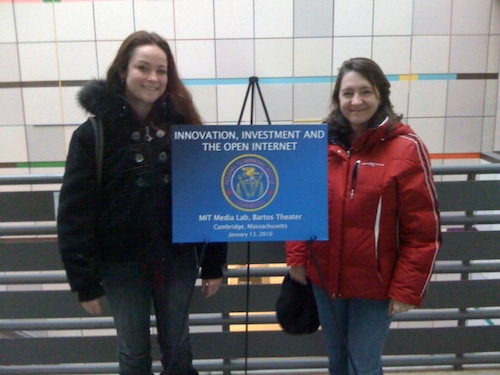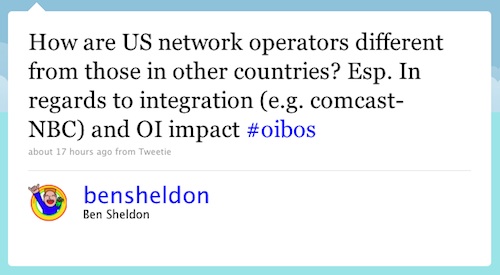Observations on the FCC Open Internet Workshop at MIT

The Transmission Project staff took a field-trip to yesterday’s FCC Workshop on Innovation, Investment and the Open Internet. As a 3.5 hour, 12 panelist show (plus 2 moderators, a introductory framer, a commissioner and a video introduction from Chairman Genachowski), it was surprisingly engaging. The key question of the evening seemed to be framed as “Business isn’t so bullish on internet anymore, what’s changed?”
Despite the contemporary focus on Net Neutrality, that phrase was nearly never mentioned. Instead, the panelists answered the key question of “what’s changed?” from a number of angles:
- New technology enabling better (or worse, depending on POV) Quality of Service (van Schewick, Standford Law);
- Market Power or absence of robust competition for ISPs (Greenstein, Kellogg/Northwestern);
- Declining profitability of network deployment (Weldon, Alcatel-Lucent);
- Declining interoperability, especially on mobile networks (Glueck, Skyfire);
- Shared ethos and goodwill have been replaced by business management and unclear rules (Berners-Lee, W3C; and Hyatt, Conduit Labs);
- Network management/QoS inconsistency between networks (David Clark, MIT);
- The looming threat of as-yet-undefined regulation (Kim Riley, Camiant);
- Government and Google threats (Tykeson, BendBroadband);
- The internet has moved from an emerging platform to an established one (Yoo, UPenn Law)
The primary takeaway I had was “Network Management/Quality of Service (QoS) is acceptable (even beneficial) so long as it is initiated by the user, not the network or application provider”. Everyone on the panel seemed to agree that this was acceptable, and innovation would emerge around the mechanisms and models for providing this to users.

No one talked about vertical integration of networks and content providers: Comcast-NBC was mentioned just once near the end. Tim Berners-Lee was the only person on the panels who tried to represent the point of view of a end-user: indifference to the network architecture and concerns over personal privacy.
In regards to how the FCC could act, David Clark made a plea for FCC-led facilitation for consistency among network providers, rather than regulation.
Outside the panel, Brough Turner (sitting in the row in front of us) told us that much of the workshop discussion was moot: the current US economic model for network deployment won’t create robust competition.
The diversity scorecard of the panel was 11 men, 6 women; 12 white, 5 not.



Comments
Post new comment